The difference between an inverter air conditioner and a regular one: their advantages and disadvantages + which one is better to choose
There is only one important difference between an inverter air conditioner and a conventional one, but it divides externally similar equipment that solves one problem into two different subtypes.
Since a single feature affects all the main characteristics - performance, functionality, efficiency and even cost.
Therefore, the choice should be made after becoming familiar with the advantages and disadvantages of each type of equipment. Otherwise, there is a high probability that you will not be able to achieve the expected result.
The content of the article:
Differences and determination of the best type of air conditioner
Without outside help, a person who does not have special knowledge is unlikely to distinguish inverter air conditioner from ordinary. The reason is that they look the same and are able to provide a comfortable temperature in the room.
Let's take a closer look at the main differences between these seemingly identical types of climate control equipment and figure out which one is better to buy.
Difference #1 - the principle of operation of the technology
There is still a difference between inverter and conventional technology, and it is fundamental, and it lies in different operating principles that affect all other characteristics, including performance and cost.
Therefore, you should know that:
- a conventional air conditioner operates cyclically;
- The inverter unit operates continuously.
So, if a traditional type of equipment is connected to the network and programmed, it will immediately begin to cool the air in the room, using 100% of its power.
And when the temperature specified by the user is reached, it will turn off. More precisely, the cooling of the air will stop, while the control body will continue to operate.
That is, then the processor, using the readings of the temperature sensor, will simply compare the difference between the actual and the desired temperature. When the maximum permissible deviation is reached, the air conditioner will again begin to cool the air masses, and again with one hundred percent power.
And such cycles will be repeated regularly, but at different intervals, throughout the entire operation.
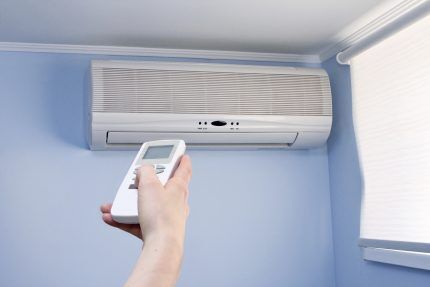
The inverter analogue, after being connected to the network and programmed, will initially function similarly to a conventional product. That is, it will try to cool the air to the required level as quickly as possible, using all its resources.
But then it will not turn off like a traditional unit, but will go into “sleep” mode.During which it will perform cooling using 5-10% of the available capacity, which will allow maintaining the temperature specified by the user, using a minimum of resources and electricity.
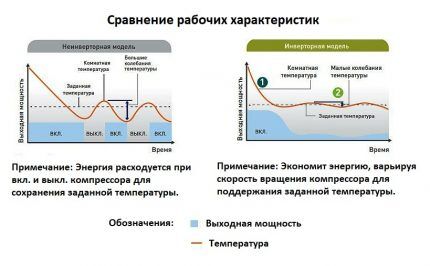
The described differences in the operating principle leave an imprint on all the main characteristics of the equipment.
Namely on:
- functionality;
- efficiency;
- resource;
- reliability;
- noisiness;
- impact on health;
- price.
And when choosing, all of the above should be taken into account, because the difference between a modern inverter and a conventional cyclic air conditioner is much greater than many buyers imagine. But none of them has a clear advantage.
Difference #2 - hardware functionality
Any of these types of equipment can cope, and effectively, with air cooling. But when compared, the difference in time spent and electricity in each individual situation will be noticeable.
Due to their more stable operating mode, inverter air conditioners have a number of advantages. Among which are durability, reliability and efficiency.
And this is true, but the question is whether the user will be able to receive the promised savings of 30-40% and even 50%, as indicated in the advertising of individual models. The answer here is clear: no.This is especially true given the high cost of more technologically advanced inverter products.
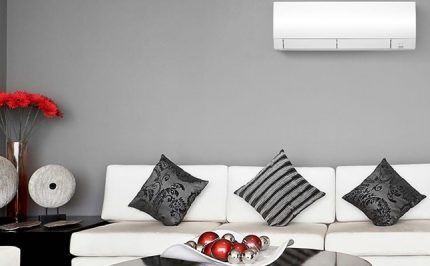
These features make an inverter air conditioner more practical for use in bedrooms, hotel rooms and other rooms where the temperature is stable. And here less time and energy will be spent than when using conventional analogues.
This happens because more high-tech inverter products are able to maintain the temperature more accurately and with less deviation. Namely, within half a degree up or down from the user-set value.
For comparison: with conventional air conditioners, the temperature delta is within 3 °C, that is, the spread will be 1.5 °C in each direction from the programmed level.
Which, together with the high operating power when used in bedrooms and other similar rooms, leads to the periodic occurrence of air flows, which, at a minimum, do not increase the comfort of living and relaxation.
But the impressive peak power of any traditional air conditioner in comparison with inverter analogues makes them more functional and practical where sudden and frequent changes in temperature occur.
This often happens even in an ordinary kitchen, where additional heat sources in the form of gas, electric stoves, and other equipment lead to changes in conditions. And here the cyclicity and maximum speed of traditional air conditioners will become the optimal solution.
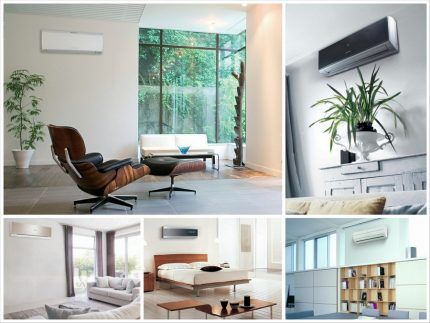
At the same time, their inverter analogues will not perform their best under unsteady temperature conditions. The situation will be similar in walk-through offices, shops, and service premises, where the thermal background often changes.
In a number of situations, the advantages of an inverter will be offset to one degree or another by the capabilities of conventional units that are not the most efficient, but are better suited for certain conditions.
A conventional air conditioner is the best option when you need to cool the air once. For example, this happens in conference rooms.
That is, we can conclude that inverter models will be a good purchase in conditions where the set temperature simply needs to be maintained and when there are no frequent and significant changes. A conventional air conditioner will show its best qualities under rapidly changing conditions.
All modern inverter climate control equipment has an important advantage - the ability to heat rooms in severe frosts, down to -25 ° C. This is something that cannot be achieved from their traditional counterparts due to the operating principle.
The reason is cyclicality, which leads to the fact that the lubricant used for moving structural elements in the off position at a temperature that drops below -5 ° C quickly polymerizes, that is, hardens. As a result, it is better not to use the air conditioner until the weather warms up.
If you ignore this rule, then everything will end in premature failure, possibly even at the first start.
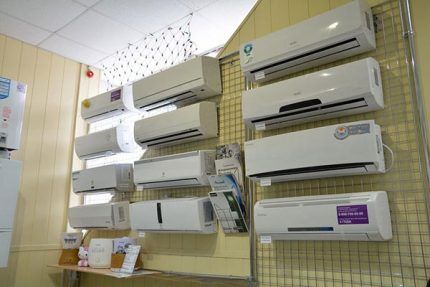
With an inverter air conditioner running continuously, the situation described can only occur in extreme temperatures. But you still need to understand that it is hardly advisable to heat rooms with such equipment, and in many cases it will not be able to provide comfort at all.
Difference #3 - cost-effectiveness of resource consumption
In advertising and other sources you can often find information that inverter air conditioners consume an order of magnitude less electricity. It is often even stated that savings can reach an impressive 30-40% compared to conventional analogues.
But such information should be treated with skepticism, since such calculations are nothing more than theoretical assumptions. But no one performed real calculations.
As a result, inverters can be considered more economical, but given their high cost, it is unlikely that benefits will be obtained over a short period of use.
And in the next 5-10 years, most likely, an even more economical, modern and efficient type of equipment will appear. As a result, using an inverter for how long will simply not be a profitable solution.
So it turns out that not a single type of air conditioner has a clear advantage in this category.
Regarding the working life of air conditioners, you can find a fairly large number of statements on the Internet that inverters that use a small power reserve have less wear on moving parts and mechanisms.This provides them with a significantly longer service life.
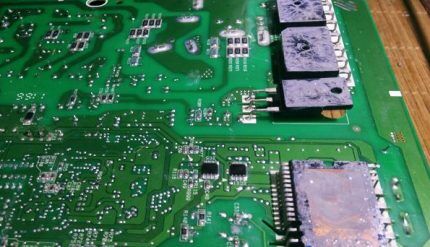
It is often pointed out that a conventional unit will delight users in almost half the time. But such statements are more like marketing ploys of manufacturers and sellers. Since not a single serious independent organization has conducted any research.
You should also know that the most loaded part of any air conditioner is the compressor that moves the refrigerant.
Therefore, according to logic, it should break first, and this should happen as a result of mechanical wear and critical surges in the value of starting currents, exceeding normal values by 5-7 times.
But it is enough to remember that compressor It is the most loaded element in refrigerators, a number of other units, as well as in older models of air conditioners. And all of the listed products can work for decades, without breakdowns.
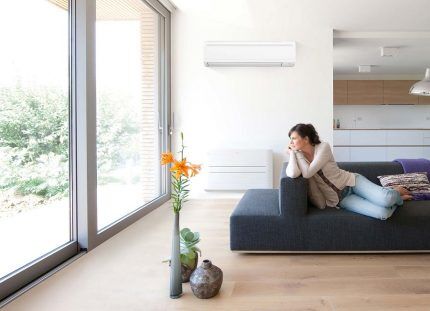
Difference #4 - operational reliability
When you try to find out how a technologically advanced modern inverter air conditioner differs from the non-inverter air conditioner familiar to most people, it turns out that there is nothing.Since equipment of any type can function for years without breakdowns.
But you should be aware of one important feature of inverters: they are quite sensitive to voltage drops, and not even the most impressive ones. Therefore, if you have such a problem, you should always give preference to the usual type of climate control equipment.
Otherwise, one of the two electronic boards that divide air conditioners into conventional and inverter ones may fail. As a result, for repairs the user will have to pay the amount of money with which he can buy a new inexpensive non-inverter.
And in many cases you will also have to wait, sometimes for quite a long time, since due to the high cost, not every service will allow itself to keep these components “in reserve.”
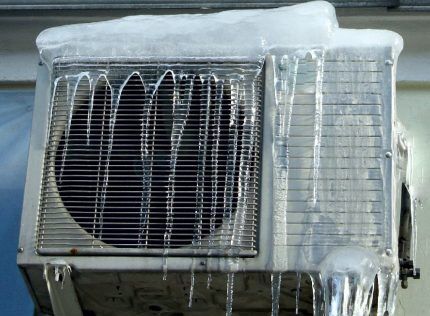
For the sake of objectivity, the last scenario should not be considered as a key one, since the boards of inverter air conditioners fail quite rarely, but still 0.5-1% of buyers will have to encounter such a problem.
Difference #5 - additional parameters and cost
Lovers of comfort pay special attention to operating volume, but here everything is simple. And this is because most air conditioners consist of two units: internal and external. Moreover, the latter is intended for installation of a noisy structural component, which is the compressor.
As a result, it can be argued that not a single variety will reduce the level of comfort.
You can find information indicating that inverter air conditioners supply warmer air (with a temperature of 12-16 ° C) into the room and this gives users less chance of getting sick.
But again, no one documents such statements, that is, no studies have been conducted. Therefore, the indicated data is a product of marketers and both subspecies do not particularly affect human health.
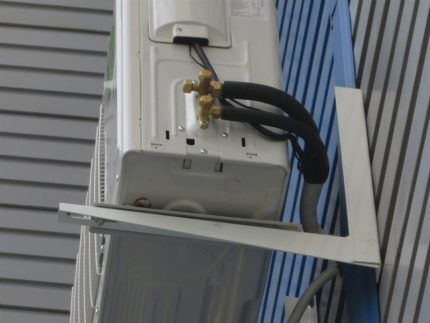
Although a poorly placed classic unit can really cause a cold with its powerful stream of air. But this problem relates more to incorrect installation or even the choice of product.
If you compare the price tags of models that are similar in functionality and performance, but belong to different subtypes, it turns out that you will have to pay more for inverters than for conventional ones. Moreover, it is significant - the difference can be an impressive 40%.
Pros and cons of two types of equipment
All the main points affecting the performance characteristics that buyers pay attention to were discussed above. Since there are many of them, we will highlight the key features that influence the correct choice.
Advantages of climate control equipment
First, let's look at the main advantages of inverters, and then compare them with conventional types of equipment.
The main advantage of any inverter air conditioner is the ability to provide a higher level of comfort in various rooms. Where the temperature background is stable and needs to be maintained, for example, in residential premises.
And also where a special regime is needed, for example, a wine cellar, a gym, and also where some rarities (books, paintings) are stored or in a home greenhouse.
Inverters have certain advantages in energy efficiency and functionality. But they should not be taken into account by renters, people planning to change housing, since they will not allow them to obtain real benefits, at least in the next many years, as is the case with efficiency.
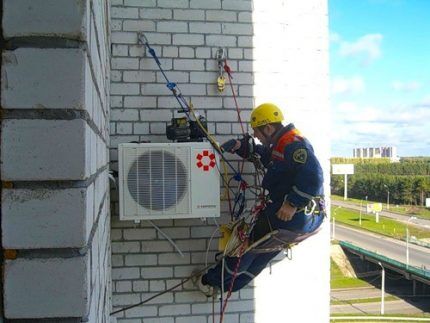
At the same time, classic air conditioners will more effectively create the desired microclimate if this needs to be done once or to cope with sudden temperature fluctuations.
Another advantage of non-inverters is that they are almost half the price, which negates some of the energy efficiency advantages of inverter analogues.
Also, conventional models are more repairable. This fact is confirmed by the lower cost of the restoration procedure.
And the likelihood of downtime due to breakdown is lower for this type of air conditioner. Which makes them the optimal solution for cooling air in rooms where stable temperature conditions are critically needed, for example, in server rooms.
An important advantage of classic units is their greater adaptability to the realities of power supply in our country. Namely, frequent power surges, even in many large cities.
Disadvantages of different types of air conditioners
A significant disadvantage of inverters is that you cannot save money when purchasing such a product.That is, you should not buy a unit that belongs to the budget segment - they have a narrow range of compressor power adjustments (within 40-70%).
As a result, cheap models simply cannot cope with maintaining the set temperature. Today, the optimal indicator is considered to be the range of 5-90%. If there is no money for this option, then it is better to purchase a budget conventional air conditioner from a well-known manufacturer.
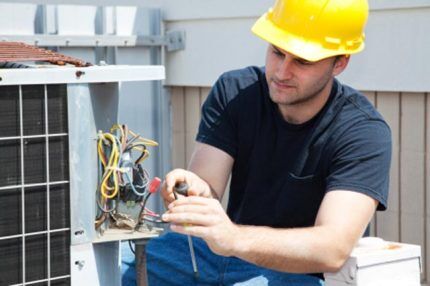
Besides, inverter model It is recommended to purchase slightly more power than is required in a particular situation, according to calculations. Since this guarantees quiet, economical and efficient cooling of air masses.
When purchasing traditional air conditioners, it should be taken into account that significant surges of starting currents can become a problem for the electrical network if it is outdated and was not designed for the use of such equipment. And this poses a danger to users.
Conclusions and useful video on the topic
The first video will help you better understand the topic:
The second video is dedicated to the differences between types of equipment:
If you are in doubt which is more practical: inverter air conditioner or regular and don’t know which one is better to choose, then first you need to evaluate your living conditions.Evaluating the latter will help determine which type of air conditioner will show its best properties in the room where it is supposed to be installed.
By the way, you shouldn’t skimp on installation either - such an approach will eliminate problems with air cooling, and, therefore, the buyer will not be disappointed in the purchase.
If you have any questions, you can ask them in the block below. Please leave your comments and share your experience in the block below.



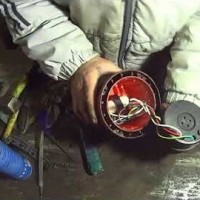
A regular air conditioner is more suitable for me, since it costs less than an inverter. And plus, I like periodic work better, since I don’t turn it on for a long time anyway. The air conditioning makes me feel cold and it blows. Therefore, I turn it on for a short time while I am leaving the room, so that the room will cool down when I arrive. That's why I don't need an inverter.
But I, Anna, work at home, so an inverter air conditioner suits me better. Of course, it depends for what purpose you need it. I like it when the room temperature is maintained at a constant, comfortable temperature for me, so that I don’t have to reach for the remote control every time I need to turn it on or off.
Except that I still doubt that an inverter air conditioner is more profitable. It turns out that you save on energy, but overpay for the cost? I wonder what others think about this?
I have to disappoint you, but if you buy an inverter just to save on electricity, you will most likely spend extra money and time. The cost of a good inverter is astronomical. And if you also take into account the fact that you can’t find a good inverter technician during the day, then this idea becomes completely pointless.Some part will fly away, and then you will look for a craftsman, and if you find it, you will wait two months for the part, and you will also pay a decent amount.
So, regarding condos, it’s better to take a regular one and not worry about it. There prices are adequate for both purchase and repair.
Good afternoon, Konstantin. To operate with numbers, I advise you to use our article “How much electricity does a split system consume?" The author takes a regular air conditioner that consumes 700 watt-hours and receives a monthly electricity consumption of 168 kWh, and a monthly electricity fee of 900 rubles.
Inverter, he writes, consumes 0.5~0.6. Let's take the average value - 550 watt*hour. This is 78% of 700. In other words, 22% of electricity is saved, and 131 kWh is consumed monthly. The fee drops to 700 rubles.
If we consider new models - for example, Samsung New Boracay, which began selling in April, then its efficiency is much higher - 31%. With it, the monthly fee will be 620 rubles.
The difference in the annual fee will be (900 rubles – 620 rubles)*12 = 3360 rubles.
The model that the author is considering - ASW-H07A4 - costs ₽23,500, Boracay - ₽32,990. The price difference is 9490 rubles.
Now it is clear that the inverter will pay for itself in the saved electricity in three years.
Choosing a split system is exactly the case when it is best to do what most people do - buy a regular one. Firstly, it will initially be cheaper, and secondly, it will be completely unpretentious in maintenance. Plus, again, repairing a conventional split costs adequate money, unlike the same inverter, which is certainly more reliable and more economical, but is not worth the money that is asked for it.